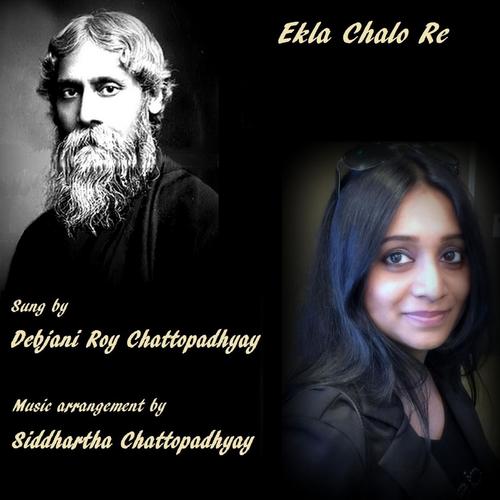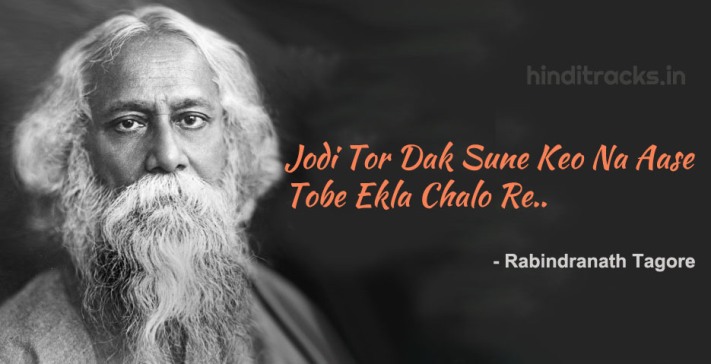

Chatterjee:Sadhaka of Universal Man, Baul of Infinite Songs. Archived from the original on 20 April 2008. Rabindranather Bhanga Gaan (in Bengali) (1st ed.). Rabindranath Tagore: The Singer and His Song (1st ed.). Rabindra-Sangeet-Kosh (in Bengali) (2nd ed.).

Įminent Rabindra Sangeet singer Suchitra Mitra recorded this song twice, first in 1948 (record no N27823), for the film Sandipan Pathshala, then in 1984 (record no PSPL 1501). Two other records of the song made by Harendranath Dutta (record no P5270) and Hindustan Party (comprising Amala Dutta, Nandita Devi, Sudhin Dutta and Santidev Ghosh) (record no H 191) are released by Gramophone Company of India and Hindustan Records respectively. Recording history Įkla Chalo Re was first recorded by Rabindranath Tagore himself sometime between 19. The notation was first published in the April–May 1906 issue of Sangeet-Vignan Prakashika magazine and later incorporated into the 46th volume of Swarabitan, the complete collection of Tagore's musical notations. The musical notation of "Ekla Chalo Re" was prepared by Indira Devi, a niece of Tagore. In 1941, it was incorporated into the "Swadesh" ("Homeland") section of Gitabitan, the complete anthology of Tagore's music. "Eka" was first included in Tagore's song anthology Baul in 1905. Titled as "Eka" ("Alone") the song was first published in the September 1905 issue of Bhandar magazine. It was one of the 22 protest songs written during the Swadeshi period of Indian freedom movement and along with " Amar Sonar Bangla", it became one of the key songs for the Anti- Partition Movement in Bengal Presidency in 1905. "Ekla Chalo Re" was written at Giridih town in modern-day Jharkhand, India. If the dark night brings thunder and storm at the door - then let the lightning ignite the light in you alone to shine on the path If no-one shines a light (on the path), O unlucky one, If no-one heeds your call - then walk alone If no-one looks back towards the (your) unpredictable path, then with thorn pricked (of the path) bloodied feet, walk alone If everyone walks away, O unlucky one, everyone walks away

If everyone turns away, if everyone fears (to speak), then with an open heart without hesitation speak your mind alone If no-one speaks (to you), don't think you are unfortunate, if no-one speaks (to you), If there is no-one responding to your call - then go on all alone Here is the translation in prose of the Bengali original rendered by Rabindranath Tagore himself. Jodi tor dak shune keu na ashe tobe ekla cholo re X2, Jodi jhor-badole adhar rate duar dee ghore- X2 Jodi gohon pothe jabar kale keu phire na chae, jodi gohon pothe jabar kale keu phire naa chaai. Jodi shobai phire jae, ore ore o obhaga,shobai phire jai O tui mukh phute tor moner kotha ekla bolo re. Jodi shobai thake mukh phiraee shobai kore bhoe, jodi shobaai thake mukh phiraae shobai kore bhoi. Jodi keu kotha na koe, ore ore o obhaga,keu kothana koi Jodi tor dak shune keu na ashe tobe ekla cholo re Tobe ekla cholo, ekla cholo, ekla cholo, ekla cholo re. Jodi tor dak shune keu na ashe tobe ekla cholo re, X2 The verses of Ekla Chalo Re read as follows: Mahatma Gandhi, who was deeply influenced by this song, cited it as one of his favourite songs.

The song is often quoted in the context of political or social change movements. The song exhorts the listener to continue their journey, despite abandonment or lack of support from others. Ekla Chalo Re was incorporated in the "Swadesh" (Homeland) section of Tagore's lyrical anthology Gitabitan. It was influenced by Harinaam Diye Jagat Matale Amar Ekla Nitai Re, a popular Bengali Kirtan song of Dhapkirtan or Manoharshahi gharana praising Nityananda, disciple of Chaitanya Mahaprabhu. Originally titled as "Eka", the song was first published in the September 1905 issue of Bhandar magazine. Jodi Tor Dak Shune Keu Na Ase Tobe Ekla Cholo Re ("If no one responds to your call, then go your own way alone" ), commonly known as Ekla Cholo Re, is a Bengali patriotic song written by Rabindranath Tagore in 1905.


 0 kommentar(er)
0 kommentar(er)
